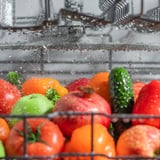Should You Be Washing Your Vegetables in the Dishwasher?
 Get the Full StoryWe all know dishwashers are a godsend for cleaning pots and pans with less effort, but now Tiktok is saying we should add produce to that list: A video went viral of a mom putting her freshly purchased fruit and vegetables into the dishwasher with vinegar to clean them. Her daughter, who's filming, asks if this is normal, to which her mom replies, "It's normal for everyone, believe me."
Get the Full StoryWe all know dishwashers are a godsend for cleaning pots and pans with less effort, but now Tiktok is saying we should add produce to that list: A video went viral of a mom putting her freshly purchased fruit and vegetables into the dishwasher with vinegar to clean them. Her daughter, who's filming, asks if this is normal, to which her mom replies, "It's normal for everyone, believe me."She was proven wrong in the comment section. While some users had heard of her hack, many others expressed some all-too-relatable confusion. But are we missing out? Should we be washing our produce in the dishwasher? Here's what an expert had to say.
Is It Safe to Wash Produce In the Dishwasher?
"It's probably not unsafe to put the produce in the dishwasher, but I highly doubt it is worth it," says Jennifer C. Acuff, Ph.D., assistant professor in food safety and microbiology at the University of Arkansas' System Division of Agriculture.
Now, washing produce before you eat it definitely is important, she says. Fruit and vegetables are grown in the open environment where pathogens from wildlife and livestock are carried by the wind, soil, and other methods. That means the fruits and vegetables you bring home from the store or the farmstand may potentially be not only dirty still, but also contaminated with foodborne pathogens, like salmonella or pathogenic E. coli, that can cause illness.
"Washing produce removes dirt as well as the associated pathogens if they're present," Dr. Acuff explains.
While dishwashers are powerful cleaners, there's a catch to washing your fruits and veggies in one: "One of the things that make dishwashers so good at cleaning and disinfecting our dishes is the high pressure and high heat," she explains. But those same features - heat and high pressure - will essentially cook your produce as they clean it, which probably isn't a side effect most people are willing to trade for the convenience.
That said, some dishwashers have a cool rinse cycle that doesn't use high heat. There are even some select read: expensive dishwashers that have a "produce" setting. These usually run for a short cycle 15 minutes or so and only use cold water. In this instance, it's probably perfectly fine to run your fruits and veggies through the machine - but do you really need to?
While it might save you a little time, there is a risk that there's detergent residue or even germs inside the machine that could transfer to your fruit and vegetables, according to the Washington Post. Or those pathogens Dr. Acuff mentioned could transfer from one piece of produce to another. And if you're not using the high heat setting, you're not getting the disinfectant benefits it offers.
The addition of vinegar may not do much at all. A 2006 study in the Journal of Food Protection shows that rinsing fruits and vegetables with white vinegar isn't any more effective at removing bacteria than rinsing with running tap water. In fact, the United States Department of Agriculture itself clearly states that running water is all you need to wash produce.
"There's nothing you can do to 'sterilize' your produce at home, except to further process it through cooking or canning, but that defeats the goal of a lot of consumers consuming raw produce," Dr. Acuff says.
So, it turns out, the most effective way to rid your fruits and vegetables of dirt, debris, and bacteria is actually the easiest: Good old-fashioned rinsing and scrubbing with basic tap water, followed by drying with a paper towel.
Rachael Schultz is a seasoned health, fitness, and outdoors writer with bylines at PS, Men's Journal, Men's Health, Shape, Forbes, Equinox's Furthermore, and Insider Reviews. She's endlessly fascinated by why our bodies and brains work the way they do and how science says we can optimize both without losing our sanity .
Share: